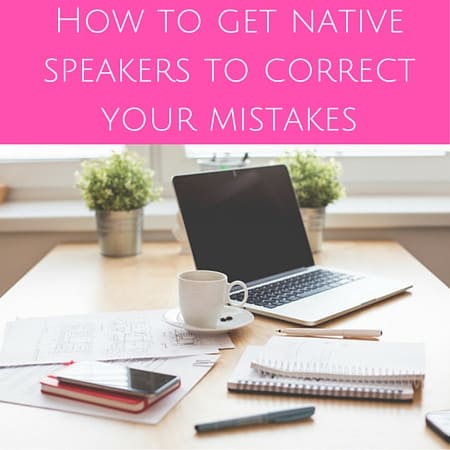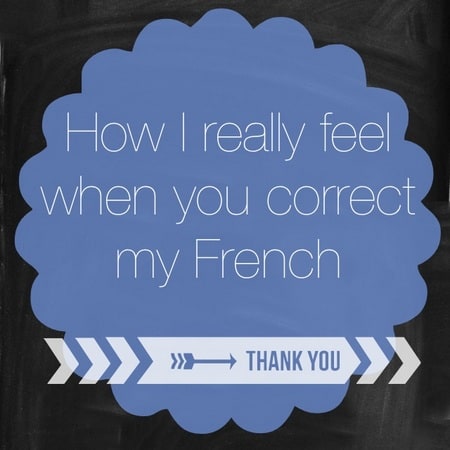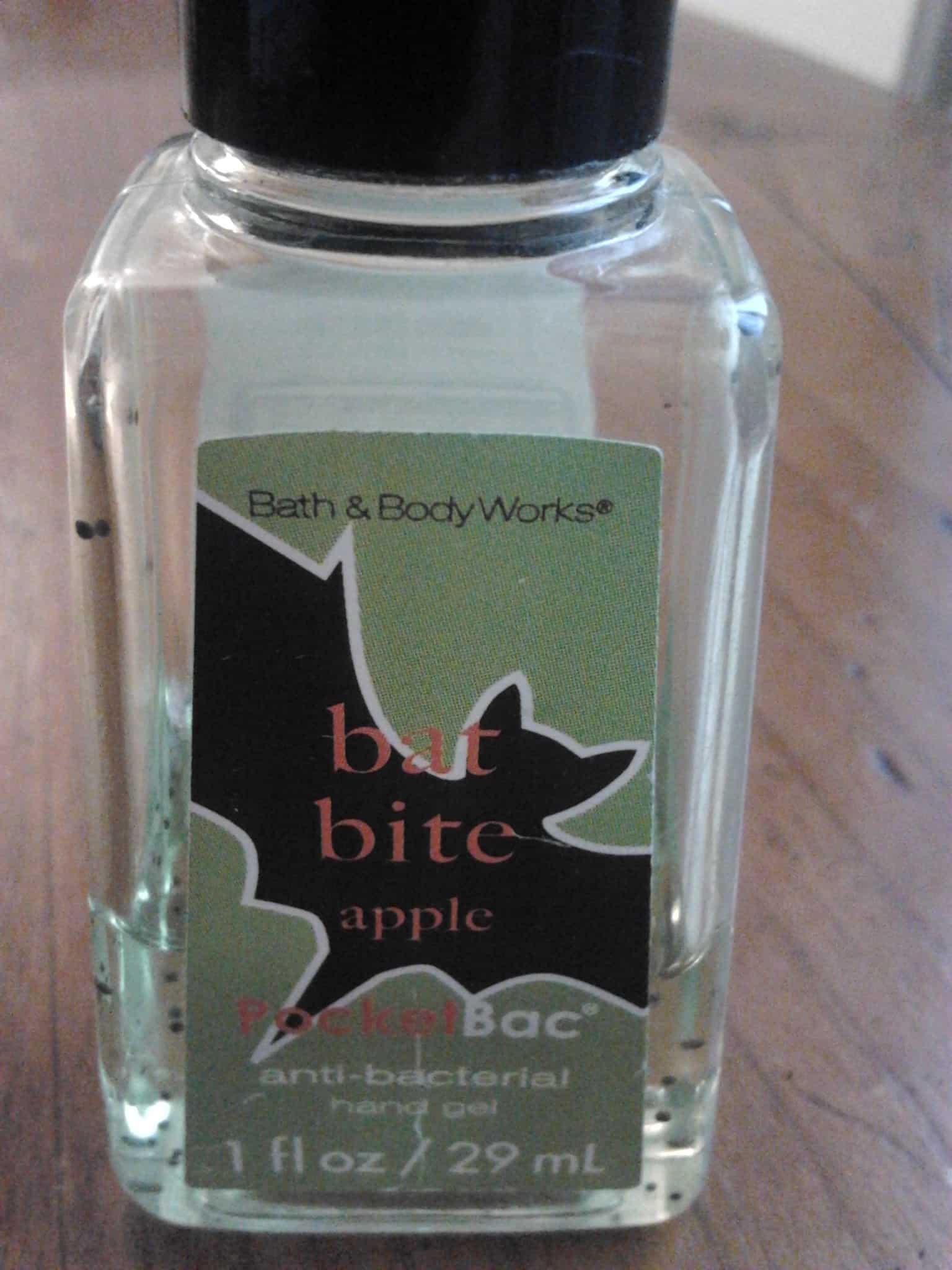As someone who started learning French as an adult, I take all the help I can get. I tell almost every French person I meet to PLEASE correct my French mistakes since it’s the only way I’ll learn. Some oblige and others say OK sure and then never correct anything I say.
Why is this and how can you get native speakers to correct your mistakes in French?
How to get native speakers to correct your mistakes in French
Anyone who has ever learned a language has been given a correction. It’s only normal to mess up. Was it in school? Was it from a friend or a perfect stranger? How did it make you feel? Did your culture (or the culture of the person doing the correcting) play in to how they corrected you? You can tell me all about that in the comments and I’ll tell you all about when French people correct my French.
Personally speaking, every couple of weeks, Tom will point out one of my French mistakes that leaves me feeling kind of mortified. It’s not the fact that I’m making these mistakes that kills me (I make enough mistakes regularly so it’s no big deal).
It’s the fact that it’s always something I’ve said no fewer than 10 times in recent memory to a whole host of people (like that perverted dog thing).
Here I am thinking I’ve been saying the right word or expression, then realize I’ve been messing up, and yet not one of the French people I’ve said the mess-up to has corrected me.
I don’t know what makes me more mad — the fact that I was messing up for so long or the fact that no one bothered to correct my French.
When I try to understand others’ motivations (or lack their of, as the case may be), I put myself in their shoes and imagine what I’d do as a native English speaker back in the US when speaking with a foreigner.
In what instances is it OK to correct someone’s mistakes when they speak? Would I even step in and try to correct the person? Yes? No? What factors go into this? Before we delve into that…
Will you be fluent in French after living here for a year? >>
Remember that despite being corrected or not, it’s important to put yourself out there and try.
If you never try, you of course won’t make any mistakes. But you won’t learn anything or improve your level either.
So when it comes to correcting your mistakes in French, there are some people who will probably find it easy to dole out corrections. Take for example someone whose job it is to help you improve like a French instructor. Maybe someone who is closest to you like a spouse or good friend. But what about everyone else? Why don’t they correct your mistakes?
P.S.: The reasons below could apply to any language, not just French!
Why people don’t correct your French mistakes when you speak:
1. You’re perfectly understandable even with the mistakes and correcting them won’t affect your ability to be understood.
Ding, ding, ding! This one holds true for me big time. Once you reach a certain level and speak with relative ease, even if you do make a bunch of mistakes, people don’t feel the need to correct you for little things.
Some people will regardless, but in general, if you can get the sentence out and make yourself understood, most people won’t go the extra step and correct your speech because there’s no need.
2. They don’t really care enough to help and/or are not used to speaking with a foreigner.
Most people don’t intentionally NOT help but they just don’t see correcting your speech as a priority and they’d rather not get deep into a French grammar conversation. In many aspects of life, French language correction included, people can be lazy, plain and simple.
Along with that, some people (especially in smaller towns) aren’t accustomed to speaking with foreigners, so offering up corrections is kind of a foreign concept for them. Unless you really press them, they’re not going to voluntarily help you with your speech.
3. They don’t want you to take offense.
Sometimes we’re sensitive and people won’t know how we’ll react if they offer some friendly French advice. Will you really appreciate it or will it make you mad or more stressed and self-conscious?
Instead of possibly offending you, people just keep their mouths shut (especially if you fall into #1 above). This goes double for people you don’t really know well.
4. They don’t know you want to be corrected.
To receive the help you want, you have to first tell people you want to be corrected and that speaking properly is important to you. How will they know otherwise that you’re open to the corrections? Be explicit and say, “Correct my French, please, if you don’t mind. It’s the only way I’ll improve!”
5. The context is wrong.
The context of the situation is everything. Is this a random tourist you see on the street that you’ll never see again? Is this someone who permanently lives in the country who is clearly struggling? Is this someone you work with and see daily?
Examine the context of the situation and ask yourself if you’d honestly correct someone’s speech in each instance if the situation were reversed. Certain situations lend themselves to offering up a correction more than others.
6. It can be embarrassing for them.
French is a complicated language and sometimes the person will know what you said is wrong, will know what the correction is but won’t be able to tell you why (this has happened to me numerous times). Not all French people are teachers, nor do they want to be one with their friends.
Hanging out with friends is a time to let loose and not feel like you’re in school. So if your friend is hesitant to correct you all the time, maybe just let it go because it’s probably for the best.
Tourists in Paris: Why a little effort with French goes a long way >>
Time out, so tell me…
The last time you spoke to a non-native speaker of your language and they made mistakes, what did you do? Would it have been weird to correct them? Did you? Why or why not?
For me personally, I don’t think I’d offer unsolicited English corrections unless I 1) Knew the person was open to it and/or 2) Was struggling and kind of asking me for help with their facial expressions.
In other cases, we have the exact opposite of #1 above, where the person’s level is so poor that if you paused to correct every mistake, they’d never get a word out. In that instance when it’s counterproductive to communication, maybe it’s better to let them just continue with the mistakes.
Also, one other quick thing. Be aware that if you ask someone to correct your mistakes, and they do, it might destroy your confidence. Learning a language is a process and if you’re just starting out, all the corrections might knock you down mentally a few notches. You’d be surprised at how much this can affect us.
This goes double if you’re living in the country and HAVE to speak that language (and don’t have the luxury of just switching to English when you’re all Frenched out for the day). In some cases, it may be best to have a “no corrections” day or just ask to be corrected when something is a major mistake and not every time.
How to get native speakers to correct your French mistakes
1. Tell them you want to be corrected
Seems obvious, right? If it’s someone you know reasonably well or if it’s someone you speak to regularly, take the simple route and straight up ask them to correct your mistakes. (and then when they do, you may regret it because this is what you’re really thinking. ;-))All the time.
It might take some time for them to get in the habit of it and you may have to remind them, but make it known from the start that you welcome any and all corrections! They’ll get the point. This works well if you befriend a know-it-all or someone who is really proud of their language. Seek out people who you know are open to handing out corrections. And don’t forget to thank them!
2. Stop the sentence after the mistake
If you don’t try to fight your way through and just pause after attempting to say whatever it is you’re trying to say, the conversation comes to a halt until one of you says something. You can add a, “C’est correct ou pas?” after the possible error so the person knows you’re looking for help.
Let the French person reassure you that what you said was correct or let them offer up the correction. Repeat the correction, say your sentence again the right way and continue on.
3. Join a group that is focused on language exchange
Remember my point about context from above? If you put yourself in a situation where everyone is there to learn, you’re already on the right track. Joining a meet up group or class for language learning is the perfect context to ask for language corrections.
Finally, just one more thing. Here’s a video from Geraldine at Comme Une Francaise that ties into this conversation. It’s about how to prevent a French convo from switching to English.
***
If you’ve been on either end of the corrections conversation, tell me what you’ve done in each situation!
Do you welcome corrections? Do you freely give them? Has it ever backfired?
Want to improve your French? Check out Lingoda here.
PIN IT:









Personally, if a foreign person speaks to me in French, I don’t expect him/her to speak to me in perfect French, so if s/he speaks in broken French, I would act as if the conversation was totally normal (as long as it’s understandable enough of course!). I know how much French is a difficult language to learn, so honestly just hearing someone trying to speak it (instead of going the easy way and speaking English) makes me happy and I don’t want to ruin their effort/motivation by making remarks about their pronunciation or grammar non stop… and if it’s a friend, I don’t want to ruin the mood of the conversation…
If the person asks me to correct him/her, well I might do it for the biggest mistakes, but for the smaller ones I’m not sure… if it’s in a context like conversation table and that the aim is clearly to speak in order to correct the mistakes afterwards, sure I’ll be the pickiest with every mistakes, but in a normal day conversation I’m not sure…
As you said, the best way is that whenever you feel unsure about what you said, ask if that was correct or not to the native speaker and surely s/he will say it! That’s what I did in Japan 😉
Yup, always best to straight out ask for the correction so that way the person knows you’re open to it. It really does come down to the relationship you have with the person and if it’s an appropriate environment to speak up or not. I’m still so impressed you know Japanese!
Ha ha thank you! 😀
Hi Diane, I am French and I have the same problem but in English in Texas. I am usually told that I speak way better English than them in French and as long as they understand me, that’s what matter. I think that Americans are so used to people from all over the world speaking broken English with various accents that it becomes normal. Where in France, I think that French are more eager to correct, almost criticize until it’s a perfect French. Even when I go back to France and I make mistakes, I am corrected.
In the beginning, I asked my colleagues to correct me. Some never did. Some tried but maybe it was my fault. I wanted to be corrected but maybe the way I reacted, they did not feel comfortable to correct me. Maybe I made a face though I asked for correction.
Great post as always.
Totally agree that Americans, especially in big metropolitan areas, are used to people speaking English at all different levels and with all different accents.
I think people sometimes feel like they’re being critical by offering a correction even when asked, but really how else can we learn unless someone tells us in the moment?
This post is so relevant to me just now as I regularly email a French friend and have asked him to correct me by reply. He now highlights my errors in a different colour and corrects them which is great. Actually I was surprised that I didn’t make more mistakes but writing is easier than speaking.
As for correcting a non English speaker, if they asked for assistance I would, but if not and their English was understandable I would feel a little rude…. especially if I was not able to speak their language.
Gonna try your tip ‘c’est correct ou pas’. Thanks Diane.
Oh wow, that’s really helpful! And then you have it as a reference for next time or to refer back to. Sometimes Tom will correct me and two days later I’ll make the same mistake, so having a written record (in a different color even!) is great!
I agree with everything you said, and all the reasons why I wouldn’t correct a foreigner making English mistakes. I’m usually amazed at how well they can speak the language, and I find their mistakes charming. I wouldn’t correct someone unless they asked me to, or if they were struggling, as you said.
Yes, I think if someone specifically asks for help or is noticeably struggling, it’s OK to correct them. But know what irks me? Native English speakers correcting other native English speakers. I see tons of errors on FB and then there’s always one person chiming in to be the expert! Hahha.
I know what you mean! I see tons of spelling and grammatical errors online, too, but it would be a full-time job to correct everyone! I have a friend who constantly corrects her fiance, and then she turns around and spells things wrong! I hope she can spell DIVORCE, because her constant corrections are going to get old fast! You have to realize that it’s just not that important. Some people are good at English and others aren’t. People correcting others irks me, too. I do wonder how some people ever get jobs with the way they write…
You made a point about grammar, but French grammar is so complicated that they may not be sure themselves. A bank manager once told my mum, who lives in Normandy, this. He said many French people are reticent to write French themselves for this reason.
Yup, that’s exactly right and what I mentioned above in point #6. 😉 French people sometimes don’t know why something is the way it is and it can be embarrassing for them. Thank you for commenting!
I wish people would correct me! Especially with verb tenses. Because they don’t I end up making every other word in a sentence a question because i’m not 100% sure of the pronunciation or if it’s the right word. Other times I’ll pronounce the same word 3 different ways and then usually that’s when they will tell which one was right. But I’m guilty of it not correcting others in English either It’s a delicate balance of allowing the person to speak and interrupting them to make the corrections.
Yes, the verb tenses are no joke and I pause all the time and second guess myself. The one that always gets me is when I want to say the equivalent of the English present perfect, like “I have been living in France for 4 years.” I default in my head to a past tense, like “have been” seems like the past in my jumbled head. But in French you say the present, so je vis en France depuis 5 ans. I always have to check myself for that tense. And that’s one of the easier ones, so I feel your pain! Agree it’s a delicate balance, always depends on who you’re talking to and the relationship you have!
I am usually very happy to hear foreigner speaking french and therefore I don’t want to make them feeling uncomfortable by correcting any small mistake. The main point is that they make the effort to speak into my native language, why to discourage them by interrupting every single sentence ? I propose some correction only if the sentence in not understandable or bad word is used. Most important is that we can understand each other !
Nevertheless it could be different with foreign students who are in France to learn litterature or french language (teacher, translator or similar). In that case, yes, I can correct them more often if necessary.
So reason not to correct would be No. 1 and No. 3 for me !
Absolutely, it’s great when foreigners do their best to speak the local language and in the case of a tourist or someone just visiting for a short time, there’s no reason to discourage them with 100 corrections. Totally agree! But like you said, students or people who really want to improve and ask for corrections, it’s OK if they are open to the help. Thanks for commenting 😉
Hello, Diane
Nice blog ! And very usefull for French learners !
Cheers,
Anthony
Hi Anthony, thanks for stopping by! Feel free to email me directly at ouiinfrance@gmail.com! Bon week-end!
Great post Diane! I probably wouldn’t feel comfortable correcting people in English either unless they asked me to or I knew them really well and as you said, could see they were asking for help! I personally love corrections for my Italian. I ask my husband to make sure to correct me and I think he does most times.
Yup, I have Tom correct me as well and he’s pretty good about it, so I’m thankful for that. Glad you enjoyed this one!